人教版(2019) 选择性必修第三册 Unit 5 Poems 定语从句课件(16张)
文档属性
| 名称 | 人教版(2019) 选择性必修第三册 Unit 5 Poems 定语从句课件(16张) | 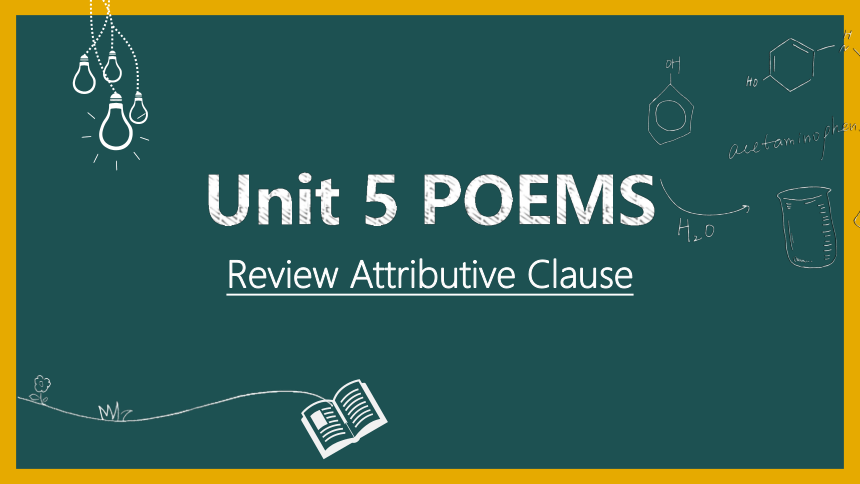 | |
| 格式 | pptx | ||
| 文件大小 | 2.5MB | ||
| 资源类型 | 教案 | ||
| 版本资源 | 人教版(2019) | ||
| 科目 | 英语 | ||
| 更新时间 | 2022-04-04 14:30:10 | ||
图片预览

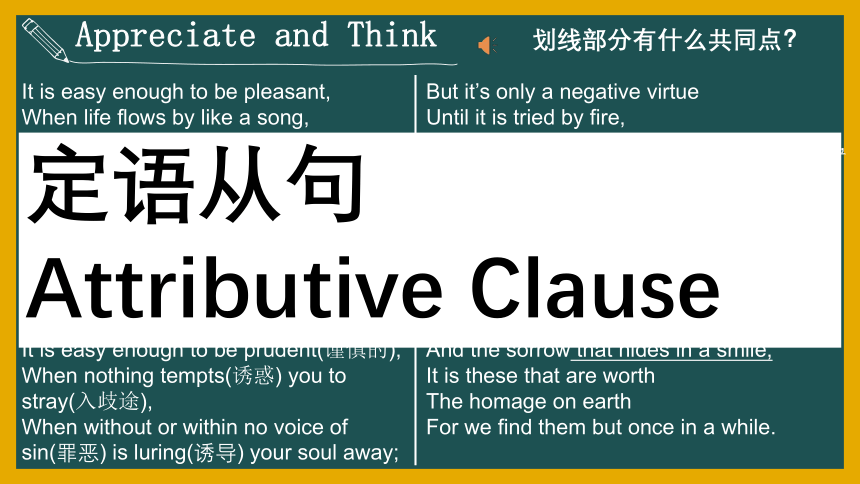
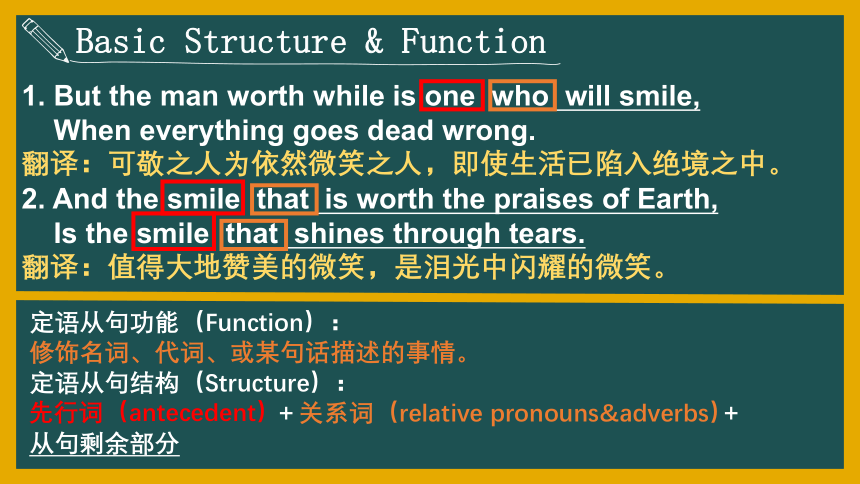
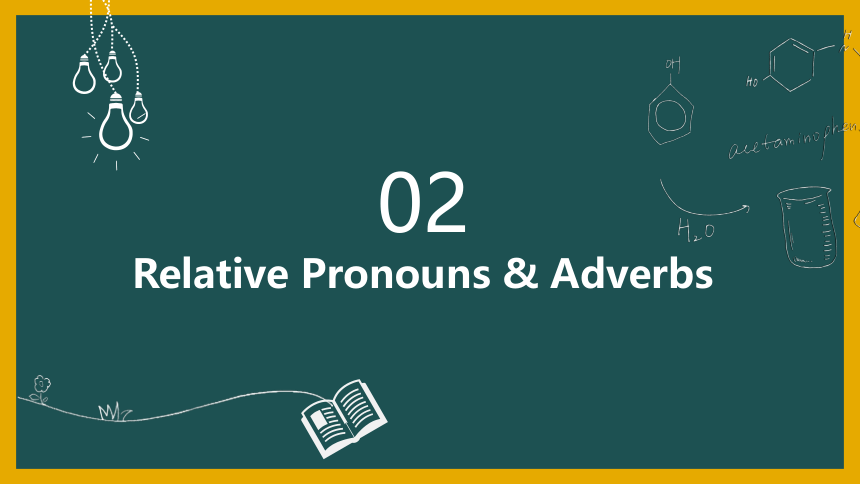
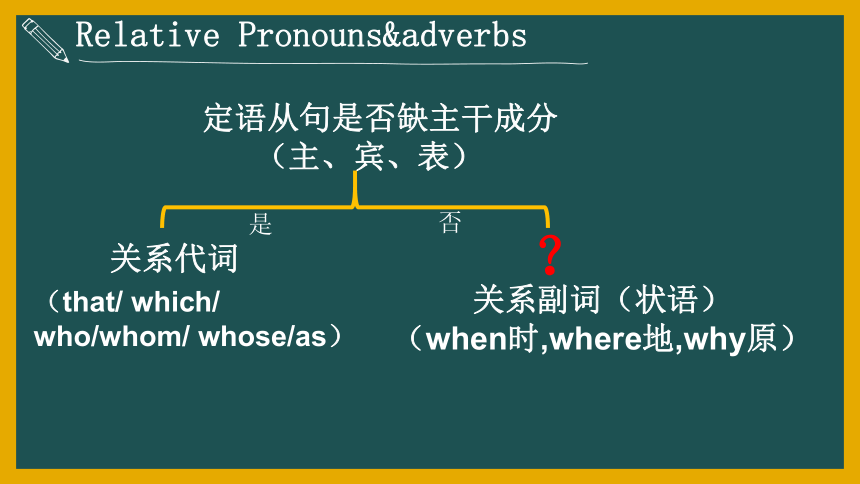
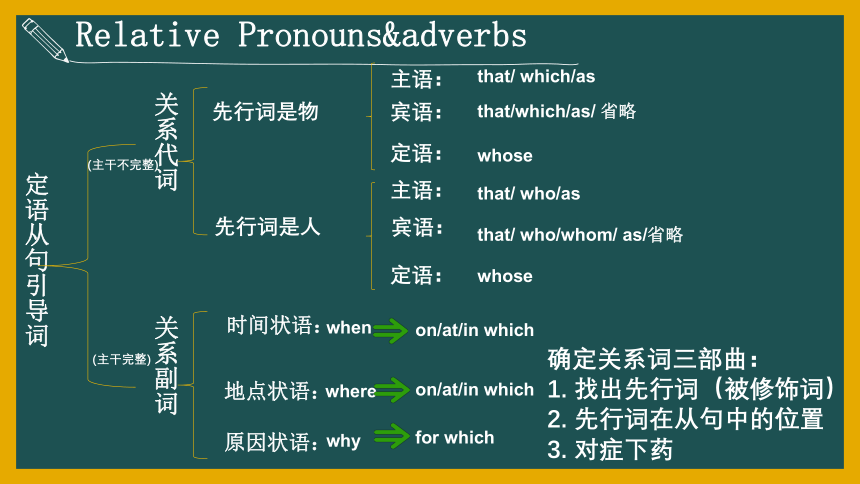

文档简介
(共16张PPT)
Unit 5 POEMS
Review Attributive Clause
Appreciate and Think
It is easy enough to be pleasant,
When life flows by like a song,
But the man worth while is one who will smile,
When everything goes dead wrong.
For the test of the heart is trouble,
And it always comes with the years,
And the smile that is worth the praises of Earth,
Is the smile that shines through tears.
It is easy enough to be prudent(谨慎的),
When nothing tempts(诱惑) you to stray(入歧途),
When without or within no voice of
sin(罪恶) is luring(诱导) your soul away;
But it’s only a negative virtue
Until it is tried by fire,
And the life that is worth the honor on Earth,
Is the one that resists desire.
By the cynic(悲观者), the sad, the fallen(堕落的),
who had no strength for the strive(反抗),
The world’s highway is cumbered to-day,
They make up the sum of life.
But the virtue that conquers passion
And the sorrow that hides in a smile,
It is these that are worth
The homage on earth
For we find them but once in a while.
划线部分有什么共同点?
定语从句
Attributive Clause
Basic Structure & Function
1. But the man worth while is one who will smile,
When everything goes dead wrong.
翻译:可敬之人为依然微笑之人,即使生活已陷入绝境之中。
2. And the smile that is worth the praises of Earth,
Is the smile that shines through tears.
翻译:值得大地赞美的微笑,是泪光中闪耀的微笑。
定语从句功能(Function):
修饰名词、代词、或某句话描述的事情。
定语从句结构(Structure):
+ +
先行词(antecedent)
关系词(relative pronouns&adverbs)
从句剩余部分
02
Relative Pronouns & Adverbs
Relative Pronouns&adverbs
定语从句是否缺主干成分
(主、宾、表)
是
否
关系代词
(that/ which/ who/whom/ whose/as)
?
关系副词(状语)
(when时,where地,why原)
Relative Pronouns&adverbs
定语从句引导词
关系代词
关系副词
(主干不完整)
(主干完整)
先行词是物
that/ which/as
that/which/as/ 省略
主语:
宾语:
定语:
whose
先行词是人
主语:
宾语:
定语:
that/ who/as
that/ who/whom/ as/省略
whose
时间状语:
地点状语:
原因状语:
when
where
why
确定关系词三部曲:
1. 找出先行词(被修饰词)
2. 先行词在从句中的位置
3. 对症下药
on/at/in which
on/at/in which
for which
Exercises
1. He finished a novel last year made him famous.
2. The man you met just now is the famouse Harry Potter.
3. The day wwe first traveled by plane finally came.
4. We know the place Professor Dumbledore lives.
5. There are 20 people in the bus and most of _______ are boys.
that
who/whom
when
where
them
,
whom
03
Three interesting things about
Attributive Clause
No.1Only Which
①在非限制性定语从句中,指代物,意为“这;这一点”。
是先行词的附加说明,去掉了也不会影响对先行词或主句的理解,它与主句之间通常用逗号分开。
②当关系代词在定语从句中紧跟介词作宾语时,指代物。
③当先行词本身就是that时。
Exercises:
1. The sun gives off light and warmth, _ _ makes it possible for plants to grow.
2.There is a dictionary in we can look up the new word.
3. She has two sons, both of graduated from Harvard University.
which
which
结论:除了以上三种情况,指代物时我们要倾向于用that。
whom
No.2 Different whose
一般我们称whose为关系代词,但它又不跟其他关系代词一样直接可以做从句的主干成分,whose作定语,译为“……的”,类似于形容词。
因此我们也可称之为“关系形容词”,既可代指人,也可代指物。
代指物时,实际上相当于“of which”;
代指人时,实际上相当于“of whom”。
Could you tell me something about the girl father is an astronaut
whose
Could you tell me something about the girl the father of whom is an astronaut
Could you tell me something about the girl of whom the father is an astronaut
No.3 Unnoticed as
as 也是一个关系代词,可以引导定语从句:
限制性定语从句:一般用于“such...as...”,”the same...as...”
非限制性定语从句:位置灵活,通常意为“正如...,正像...的那样”
Exercises:
1. He is such a kind of person we all like.
2. He was late for school again, we expected.
As we expected, he was late for school again.
as
as
Ability Improvement
1. Connect the two sentences by Attributive Clause.
It was written by the Indian poet Tagore. Tagore was the first Asian to win the Nobel Prize in Literature.
She was late for the meeting. Do you know the reason
2. Translate the following sentences by using Attributive Clause.
众所周知,他很擅长数学。(as)
那个叫小米的公司在北京。(whose)
1. Connect the two sentences by using Attributive Clause.
It was written by the Indian poet Tagore who was the first Asian to win the Nobel Prize in Literature.
Do you know the reason why she was late for the meeting.
2. Translate the following sentence by Attributive Clause.
As we all know, he is good at maths.
That company whose name is Xiaomi is in Beijng.
04
Summary
Summary
1. 定语从句功能(Function):
修饰名词、代词、或某句话描述的事情。
定语从句结构(Structure):先行词+关系词+从句剩余部分
2. A mind map of relative pronouns and Adverbs
3. 3 things about attibutive clause:
only which
different whose
unnoticed as
Homework
Finish Exercises on P53,Textbook.
Thanks!
Unit 5 POEMS
Review Attributive Clause
Appreciate and Think
It is easy enough to be pleasant,
When life flows by like a song,
But the man worth while is one who will smile,
When everything goes dead wrong.
For the test of the heart is trouble,
And it always comes with the years,
And the smile that is worth the praises of Earth,
Is the smile that shines through tears.
It is easy enough to be prudent(谨慎的),
When nothing tempts(诱惑) you to stray(入歧途),
When without or within no voice of
sin(罪恶) is luring(诱导) your soul away;
But it’s only a negative virtue
Until it is tried by fire,
And the life that is worth the honor on Earth,
Is the one that resists desire.
By the cynic(悲观者), the sad, the fallen(堕落的),
who had no strength for the strive(反抗),
The world’s highway is cumbered to-day,
They make up the sum of life.
But the virtue that conquers passion
And the sorrow that hides in a smile,
It is these that are worth
The homage on earth
For we find them but once in a while.
划线部分有什么共同点?
定语从句
Attributive Clause
Basic Structure & Function
1. But the man worth while is one who will smile,
When everything goes dead wrong.
翻译:可敬之人为依然微笑之人,即使生活已陷入绝境之中。
2. And the smile that is worth the praises of Earth,
Is the smile that shines through tears.
翻译:值得大地赞美的微笑,是泪光中闪耀的微笑。
定语从句功能(Function):
修饰名词、代词、或某句话描述的事情。
定语从句结构(Structure):
+ +
先行词(antecedent)
关系词(relative pronouns&adverbs)
从句剩余部分
02
Relative Pronouns & Adverbs
Relative Pronouns&adverbs
定语从句是否缺主干成分
(主、宾、表)
是
否
关系代词
(that/ which/ who/whom/ whose/as)
?
关系副词(状语)
(when时,where地,why原)
Relative Pronouns&adverbs
定语从句引导词
关系代词
关系副词
(主干不完整)
(主干完整)
先行词是物
that/ which/as
that/which/as/ 省略
主语:
宾语:
定语:
whose
先行词是人
主语:
宾语:
定语:
that/ who/as
that/ who/whom/ as/省略
whose
时间状语:
地点状语:
原因状语:
when
where
why
确定关系词三部曲:
1. 找出先行词(被修饰词)
2. 先行词在从句中的位置
3. 对症下药
on/at/in which
on/at/in which
for which
Exercises
1. He finished a novel last year made him famous.
2. The man you met just now is the famouse Harry Potter.
3. The day wwe first traveled by plane finally came.
4. We know the place Professor Dumbledore lives.
5. There are 20 people in the bus and most of _______ are boys.
that
who/whom
when
where
them
,
whom
03
Three interesting things about
Attributive Clause
No.1Only Which
①在非限制性定语从句中,指代物,意为“这;这一点”。
是先行词的附加说明,去掉了也不会影响对先行词或主句的理解,它与主句之间通常用逗号分开。
②当关系代词在定语从句中紧跟介词作宾语时,指代物。
③当先行词本身就是that时。
Exercises:
1. The sun gives off light and warmth, _ _ makes it possible for plants to grow.
2.There is a dictionary in we can look up the new word.
3. She has two sons, both of graduated from Harvard University.
which
which
结论:除了以上三种情况,指代物时我们要倾向于用that。
whom
No.2 Different whose
一般我们称whose为关系代词,但它又不跟其他关系代词一样直接可以做从句的主干成分,whose作定语,译为“……的”,类似于形容词。
因此我们也可称之为“关系形容词”,既可代指人,也可代指物。
代指物时,实际上相当于“of which”;
代指人时,实际上相当于“of whom”。
Could you tell me something about the girl father is an astronaut
whose
Could you tell me something about the girl the father of whom is an astronaut
Could you tell me something about the girl of whom the father is an astronaut
No.3 Unnoticed as
as 也是一个关系代词,可以引导定语从句:
限制性定语从句:一般用于“such...as...”,”the same...as...”
非限制性定语从句:位置灵活,通常意为“正如...,正像...的那样”
Exercises:
1. He is such a kind of person we all like.
2. He was late for school again, we expected.
As we expected, he was late for school again.
as
as
Ability Improvement
1. Connect the two sentences by Attributive Clause.
It was written by the Indian poet Tagore. Tagore was the first Asian to win the Nobel Prize in Literature.
She was late for the meeting. Do you know the reason
2. Translate the following sentences by using Attributive Clause.
众所周知,他很擅长数学。(as)
那个叫小米的公司在北京。(whose)
1. Connect the two sentences by using Attributive Clause.
It was written by the Indian poet Tagore who was the first Asian to win the Nobel Prize in Literature.
Do you know the reason why she was late for the meeting.
2. Translate the following sentence by Attributive Clause.
As we all know, he is good at maths.
That company whose name is Xiaomi is in Beijng.
04
Summary
Summary
1. 定语从句功能(Function):
修饰名词、代词、或某句话描述的事情。
定语从句结构(Structure):先行词+关系词+从句剩余部分
2. A mind map of relative pronouns and Adverbs
3. 3 things about attibutive clause:
only which
different whose
unnoticed as
Homework
Finish Exercises on P53,Textbook.
Thanks!
